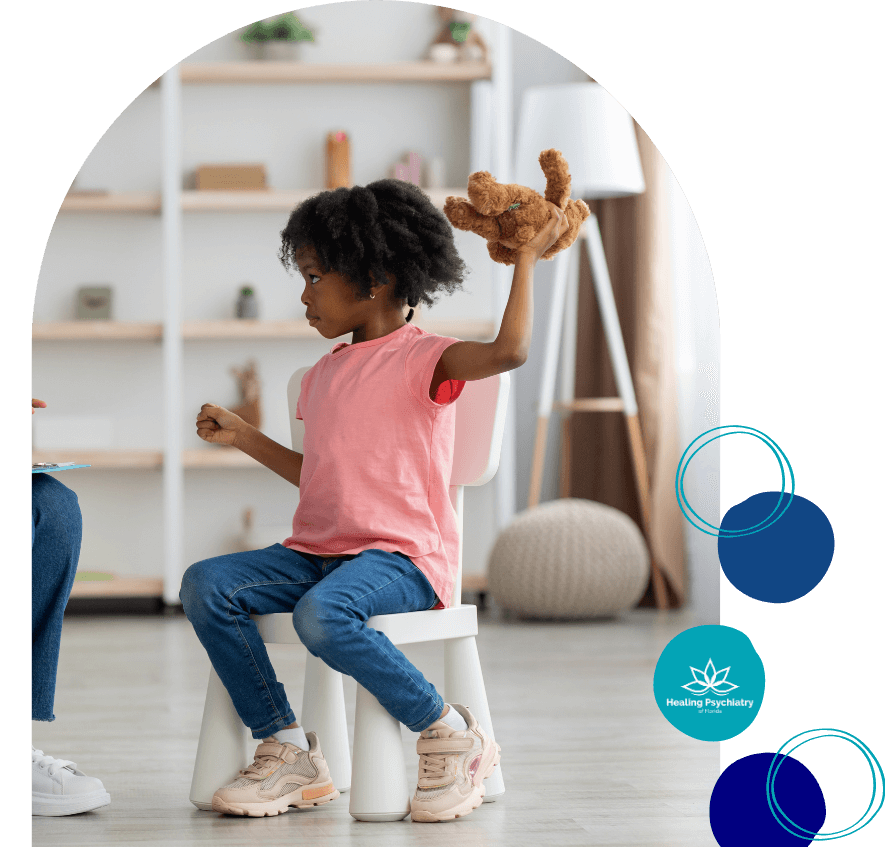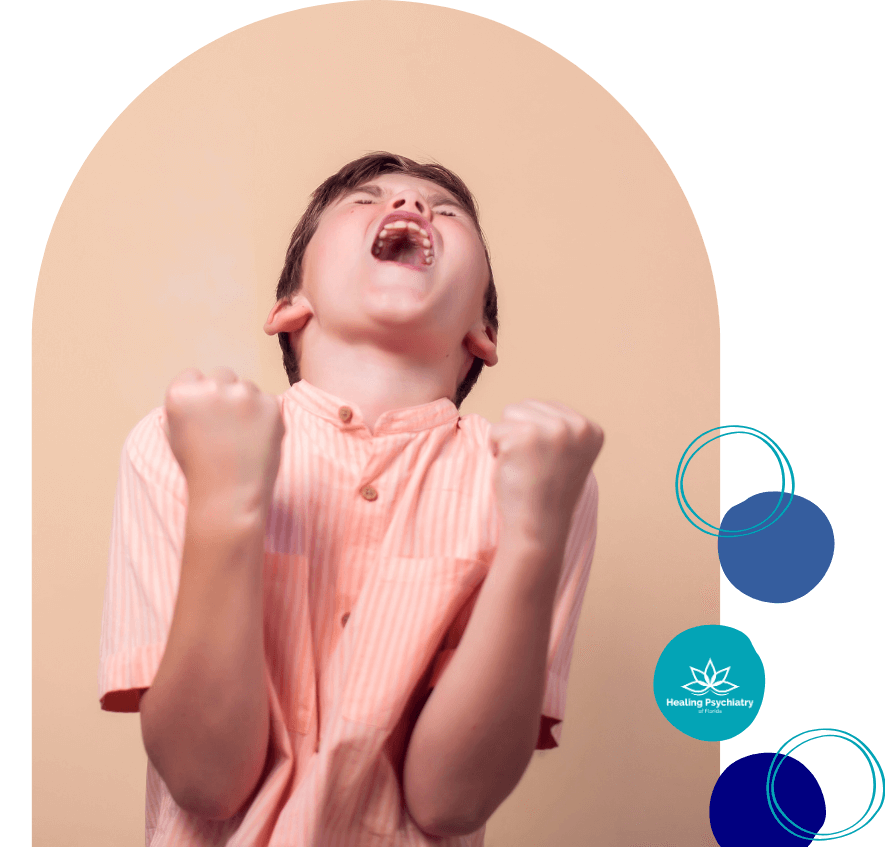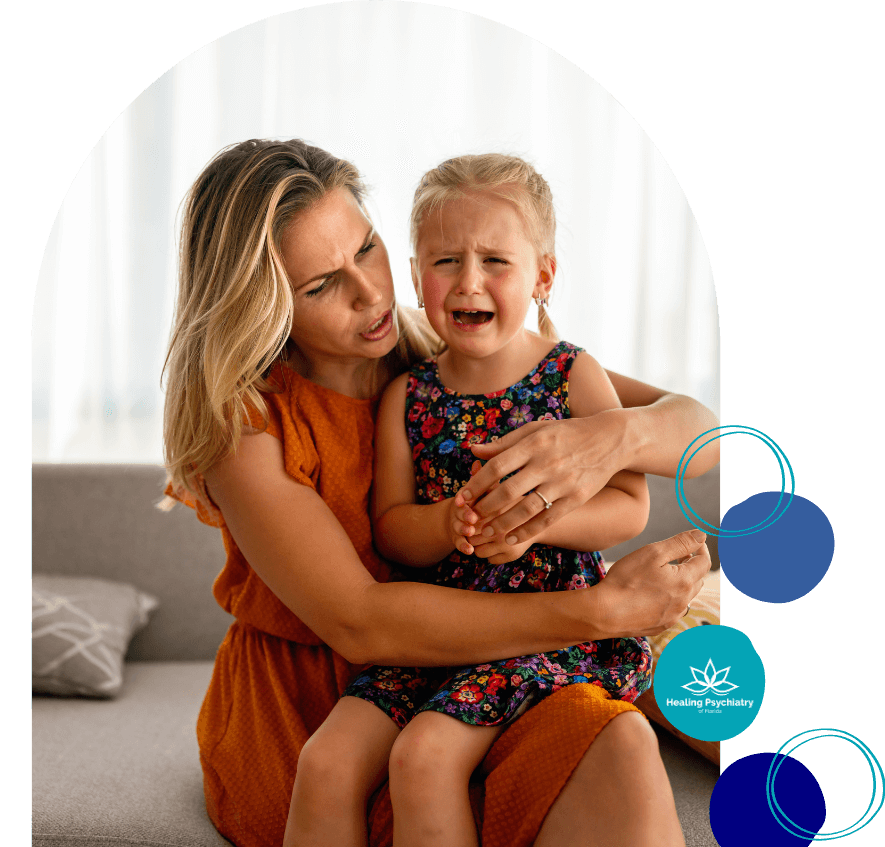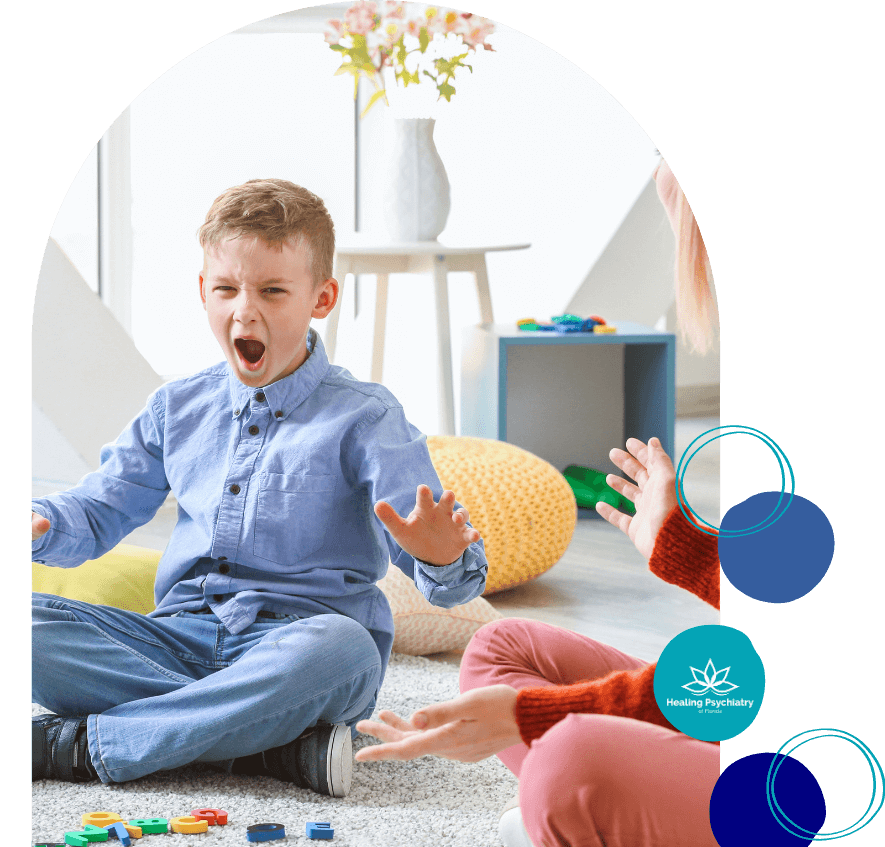Children’s Therapy for Aggression
Helping Children Manage Anger, Restore Control, and Reconnect with Family and Life.
Hitting, throwing things, or shutting down completely. Some children lash out in the classroom. Others save it for home. Most parents try everything: calm voices, consequences, rewards, routines. And when none of it works, the question becomes harder to ignore—is this something deeper than just a strong-willed child?
At Healing Psychiatry of Florida, we provide children’s therapy for aggression that helps young children and older children build emotional regulation, anger management skills, and coping strategies that actually work. Therapy targets the root causes behind your child’s aggressive behavior—whether it’s serious conduct problems, mental health disorders, or disruptive behavior tied to trauma, sensory overload, or attention difficulties.

Start Your Session Today
Children’s Therapy for Aggression:
What We Actually Do
We use evidence-based psychosocial treatments, including cognitive behavioral therapy (CBT), parent child interaction therapy, and behavioral parent training. For young children, therapy may include play therapy, sand tray therapy, and directive art-based interventions to help children externalize frustration and explore anger without escalating. Every plan addresses the child’s aggressive behavior while supporting other family members affected by outbursts, damage, or fear.
Aggressive Behavior Can Point to Underlying Mental Health Needs
Children with aggressive behavior often struggle with mental health concerns like oppositional defiant disorder, obsessive compulsive disorder, or conduct disorder. Anger issues don’t always come from defiance—they may result from sensory overload, emotional dysregulation, or mental health disorders that haven’t yet been diagnosed. We assess each child’s behavior through clinical evaluation aligned with the Diagnostic and Statistical Manual of Mental Disorders and build a treatment path that fits the root issue—not just the surface reaction.
Cognitive Behavioral Therapy That Builds Real Control
Cognitive behavioral therapy (CBT) helps children learn how to spot anger triggers, apply problem solving skills, and practice anger control. We teach children what anger feels like before it explodes and show them how to respond with appropriate behavior. Sessions combine skill repetition, role play, and emotion-focused processing to reduce frequent temper outbursts and aggressive child responses at school or home. Art therapy and sand tray therapy offer structured outlets for children who cannot yet describe what they’re feeling in words.
Parent-Focused Interventions That Actually Shift Behavior
We teach parents how to track behavior, respond without escalation, and reinforce positive behaviors without relying on guesswork. Parent management training, behavioral parent training, and collaborative and proactive solutions are core to our approach. In sessions, parents learn how to reduce problem behaviors, apply positive reinforcement, and model emotional regulation during real stress. We coach through common pressure points: mealtime battles, morning routines, aggression toward other children, and bedtime shutdowns. Supporting children starts with helping parents feel confident in what actually works.
Insurances Accepted










See what others are saying about Healing Psychiatry of Florida
Meet Our Therapy Team for Childhood Aggression
Our licensed therapists specialize in treating aggression in children through cognitive behavioral therapy, parent-focused interventions, and structured emotional support. With training in child psychiatry, behavioral parent training, and developmentally appropriate modalities like play therapy and art therapy, our team works with both the child and family.




What Progress Looks Like in the Real World
Aggression fades when children learn how to pause before reacting, recognize rising tension, and respond with self control. We track progress not just in the therapy room, but through how children respond to difficult moments—sharing toys, recovering from frustration, or walking away from anger provoking situations. These are real changes, not theory.
Most children show early shifts at home: fewer screaming episodes, more flexible responses to limits, less damage to property or relationships. We document changes in behavior, language, and mood, working with parents and schools to track how the child is functioning across daily settings.
How We Structure Therapy Sessions for Aggressive Children
Sessions include cognitive behavioral therapy, anger management techniques, and creative approaches like sand tray and play therapy to meet the child where they are developmentally. Aggressive children often struggle with verbal expression, which is why we integrate non-verbal methods like art therapy to help them process emotion safely.
Therapists guide each child through a consistent rhythm: identify the anger trigger, choose a tool, rehearse the behavior, and reflect on outcomes. Every session is focused, not abstract. For many children, this is the first space where they feel in control of how they handle stress.


Collaboration With Families, Schools, and Mental Health Providers
When needed, we consult with medical teams or refer to a child study center for diagnostic clarity. We support mental health diagnoses without rushing to label. Every recommendation fits your child’s needs and builds toward long-term improvement. Our goal is functional, peaceful, emotionally stable family life.
FAQs: Children’s Therapy for Aggression
How do I know if my child’s anger is something that needs treatment?
Look at how often it happens and how intense it gets. If your child’s anger leads to physical aggression, destruction, or frequent anger outbursts that affect home or school life, it may go beyond typical childhood anger. We treat angry behavior that disrupts daily functioning—not just big feelings, but uncontrolled reactions that hurt your child’s progress or your family’s peace.
What causes explosive or aggressive behavior in younger kids?
Aggression in younger kids is often linked to unmet developmental needs or lagging emotion regulation skills. Children might be dealing with severe mood dysregulation, sensory sensitivity, or difficulty with impulse control. Mental health treatment can help by identifying these patterns early and teaching coping skills that reduce intensity before things spiral.
Do angry children always have a mental health diagnosis?
Can therapy help children who don’t respond to discipline at home?
Yes. Many parents come to us after trying everything—time-outs, charts, calm voices—with no lasting effect. We help with behavioral challenges by teaching children how to express anger in safer ways and build positive behaviors over time. Sessions include cognitive strategies and emotional practice, but also behavior reinforcement plans that parents can apply at home.
What changes should I expect to see if therapy is working?
You might notice fewer aggressive episodes, better recovery after disappointment, and more appropriate behavior when rules are enforced. Over time, children develop self-awareness, stronger social skills, and fewer angry outbursts with other children. The goal isn’t perfection—it’s stability, connection, and lasting tools your child can use under pressure.
Do you only work with kids, or can parents get help too?
Our therapy targets the child’s behavior problems directly, but support doesn’t stop there. Parents can receive training in managing anger-provoking situations, reinforcing a child’s positive behavior, and responding to excessive anger without escalating it. The process helps the whole family—not just the aggressive child—build confidence and consistency at home.
Ready to Take the Next Step?
Your child’s challenges are real—and so is the path forward. Whether it’s focus, behavior, or emotional regulation, early support can make a measurable difference in your child’s mental health and your family’s day-to-day life. We’re here to help you build a plan that works.
Contact us
For more information about our systems and services, contact Healing Psychiatry of Florida.
Healing Psychiatry of Florida
108 W Citrus St, Altamonte Springs, FL 32714
help@healingpsychiatryflorida.com
Opening Hours
Monday – Thursday: 8AM – 7PM
Friday: 8AM – 5PM
Saturday: Closed
Sunday: Closed
OCD Therapy Altamonte Springs, FL
